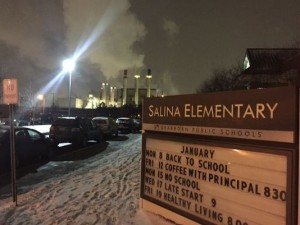From an Article by Keith Matheny, Detroit Free Press, January 29, 2018
“(W)e will immediately begin the process to rebuild trust with area neighbors and stakeholders,” said CMS Enterprises president Richard Mukhtar.
A utility’s decision to withdraw a request for a controversial new, natural gas-powered turbine — that would have increased air pollution in Dearborn by up to 1,500 tons per year — is being cautiously hailed by environmental and community advocates as a victory for residents who got informed and took action to stop the proposal.
“This is a chance for a breakthrough moment, (but) it’s not something that got here last week or last year,” said Brian Smith, a community relations specialist with the Center for Urban Responses to Environmental Stressors at Wayne State University.
CMS Energy announced Monday that it was pulling its request for a state permit to build a new steam and power generation turbine at its Dearborn Industrial Generation Plant on Miller Road. Dearborn Industrial Generation generates about 710 megawatts of power — enough electricity to power 765,000 homes — that it sells to the Midwest regional power grid operator, as it generates steam used by Ford Motor and AK Steel, the former Severstal steel plant, for their heating and processing needs.
The proposed new turbine, to better help the plant during peak power demands, would have increased carbon monoxide, nitrogen oxides, formaldehyde and other pollutants into the skies by an additional 1,500 tons or more per year — in an area of Wayne County with asthma rates that are already double the state average.
Staff with the Michigan Department of Environmental Quality, in their review of the permit request, recommended approval, concluding that it met regulatory requirements, and that the additional pollutants that would be generated would not harm people’s health or general air quality.
When the DEQ posted public participation documents related to Dearborn Industrial Generation’s proposal last fall, it had the typical, 30-day deadline for public comment, and all of the documents posted online to learn about the plan were in English, said Nicholas Leonard, a staff attorney with the Great Lakes Environmental Law Center.
“We basically pointed out to the DEQ that there are a lot of immigrants in this community; that there’s no way for people to participate in this process with all of the public participation documents being issued in English,” he said.
DEQ agreed to an extension of the public comment period, and posted key documents related to the permit request in Arabic. The Law Center issued fact sheets that helped inform the community of aspects of the proposal that they saw as problematic.
Other groups got involved as well: the nonprofit Sierra Club; the Michigan Environmental Justice Coalition; Southwest Detroit Environmental Vision, and others, Smith said. “It’s a group effort, a coalition effort,” he said.
More than 100 metro Detroit residents protested Dearborn Industrial Generation’s request during a January 16th public meeting at Salina Elementary School, which sits in eyesight of the power plant.
Former kindergarten teacher Intissar Harajli, 58, of Dearborn said when she taught at Salina in 1991-96, “those kids were always sick” and that “every morning I had to wipe the soot from the window sills, inside — it came in somehow.”
State Rep. Abdullah Hammoud, D-Dearborn, earlier this month said that approval would constitute an “environmental injustice.” Amid the widespread outcry CMS Energy did something unexpected. It listened.
After discussions with the DEQ, community leaders and others, plant officials decided to “take a step back to review its future plans at DIG and continue discussions with the community about how best to move forward in the future.”
“We take the community’s environmental protection concerns very seriously,” CMS Enterprises president Richard Mukhtar said. “That’s why we will immediately begin the process to rebuild trust with area neighbors and stakeholders, fostering more communication and collaboration as we look to the future.”
Hammoud, in a statement Monday, praised Dearborn Industrial Generation’s decision to rescind the permit request: “This is an important moment for the residents of Dearborn, who made their voices heard and expressed their concerns about air quality in the region,” he said. “We commend DIG for listening to the community it serves and for being an example of how to put people first. We look forward to partnering with DIG, local leaders, and residents on setting new, healthier expectations for our community.”
U.S. Rep. Debbie Dingell, D-Dearborn, also commended the decision. “We need to ensure that we can provide reliable, affordable energy to all Michiganders, but the need for clean air for our communities is equally important,” she said in a statement.
Smith compared CMS Energy’s decision to the permit approved at Marathon’s Detroit refinery last year, where concerns expressed by residents and city officials resulted in a revised permit that reduced the amount of air emissions below what was initially proposed.
“A lot of times in the past, these things have kind of been checking the box,” Smith said. “What’s happening now is good, because it allows for accountability. It allows for all the parties involved to do their job and do it right by the people.” The process now is more inclusive of “people who are going to be subjected to whatever they put in the air,” he said.
Cautious optimism is the order of the day, Leonard said. “We still have to wait and see what they ultimately do,” he said. “We are very happy that, for the time being, there will not be another natural gas turbine so close to an elementary school, in an area that already had such a problem with its air.
“If that proposal does come back, the community will be ready for it.”
>>>>>>>>>>>>>>>>>>>>>>>>>>>
Also from the Detroit Free Press: Michigan waste facility seeks OK to treat dioxins, among ‘most toxic man-made chemicals’

